Juraj Sucharda, Businessperson, Slovakia
 Before anything else, I need to make a confession. I think I may be a bit too emotional; I love children, I admire the unspoiled and pure world of children along with their little joys, sorrows and ’issues’. I’m glad I can be a part of it from time to time, and take a rest from the often cruel, disturbed and chaotic world of adults. When Jura Sucharda contacted me about the possibility of publishing a report called ‚Standing in Front of the Gate to Heaven’, I had mixed feelings. I wasn’t really sure if this issue is appropriate, or whether it belongs in the Week of Life sphere. Nevertheless, I accepted in advance. Then I saw the first photo from the snapshots Jura sent me, where a human hand is holding the tiny hand of a baby, who, instead of enjoying the delights of life, has to experience the first struggle for life. It hasn’t even begun and it can already be at its very own tragic end. This photo deeply touched my heart, and I immediately realized that this report should have its own place on the Week of Life website. The included text I read much later was of no less importance, however the initial glance at the photo simply showed the power of photography and its emotional impact on the inner soul of an individual. All of this combined played an important role in the decision making process. Adolf Zika
Before anything else, I need to make a confession. I think I may be a bit too emotional; I love children, I admire the unspoiled and pure world of children along with their little joys, sorrows and ’issues’. I’m glad I can be a part of it from time to time, and take a rest from the often cruel, disturbed and chaotic world of adults. When Jura Sucharda contacted me about the possibility of publishing a report called ‚Standing in Front of the Gate to Heaven’, I had mixed feelings. I wasn’t really sure if this issue is appropriate, or whether it belongs in the Week of Life sphere. Nevertheless, I accepted in advance. Then I saw the first photo from the snapshots Jura sent me, where a human hand is holding the tiny hand of a baby, who, instead of enjoying the delights of life, has to experience the first struggle for life. It hasn’t even begun and it can already be at its very own tragic end. This photo deeply touched my heart, and I immediately realized that this report should have its own place on the Week of Life website. The included text I read much later was of no less importance, however the initial glance at the photo simply showed the power of photography and its emotional impact on the inner soul of an individual. All of this combined played an important role in the decision making process. Adolf Zika
Neonatology, a subdiscipline of pediatrics, offers medical treatment to neonates, the diseased and the premature ones.
 I stood facing the gate to heaven… Someone entered it, someone else left it to descend to the Earth. I am the father of two daughters. Of two beautiful and healthy girls. I’m familiar with the far caused by fever, and even though the nights I have stayed awake might be counted on the fingers of my hands, suddenly I perceive life in a different way. I hold out my hand to a doctor – God’s right hand. In his eyes I can see incredible energy and determination. I enter the Department of Neonatology with him. As he starts his work, the chief of the department, Doctor Krcho who has been working in this field since 1989, also begins his narration about people, their worries, opportunities, about the hardship and complexity of the whole system.
I stood facing the gate to heaven… Someone entered it, someone else left it to descend to the Earth. I am the father of two daughters. Of two beautiful and healthy girls. I’m familiar with the far caused by fever, and even though the nights I have stayed awake might be counted on the fingers of my hands, suddenly I perceive life in a different way. I hold out my hand to a doctor – God’s right hand. In his eyes I can see incredible energy and determination. I enter the Department of Neonatology with him. As he starts his work, the chief of the department, Doctor Krcho who has been working in this field since 1989, also begins his narration about people, their worries, opportunities, about the hardship and complexity of the whole system.
There are 10 doctors and 38 nurses at both departments that work in four shifts. Each of them is able to accommodate between 20 to 24 babies in danger of dying. The fight for their lives starts after their arrival and a complex check-up. The first steps, taken shortly after, will be decisive not only in the development of his or her condition, but will also influence possible long-lasting consequences. However, many parents do not realize what a critical state their child is in, such as for example with severe brain damage. Almost always, they expect the doctors to perform a miracle and the possible consequences, which will affect not only the child’s life but also theirs, would not even come to their mind. Just to think of such a situation makes my flesh crawl and I have no idea how I would react were I in their place…
The stay for premature and diseased neonates ranges between two weeks and four months, depending on various factors. A child with a weight over 2,000 grams (if its condition allows it) can be taken home… But the medical care doesn’t cease and its condition is under continuous control by specialized consultories, oculists, orthopedists, cardiologists, neurologues and nephrologists… However the most important steps are taken at the Department of Neonatology…
„I believe to witness a miracle, when I see a baby born in its 24th week – whose stay in this world is a great message.“
 Premature birth can be caused not only by a too high or too low age of the mother, but also women who undergo artificial insemination are in danger, for this method allows multiple pregnancies. Furthermore, alcohol, cigarettes and an incorrect regime cause premature birth, and sometimes there can also be psychological factors, diabetes, viral infection or womb diseases that increase the danger. It might sound like a paradox, but the accomplishments of present-day medicine are also a cause of such problems, for they allow pregnancy in cases which, a few years ago, would be impossible to achieve.
Premature birth can be caused not only by a too high or too low age of the mother, but also women who undergo artificial insemination are in danger, for this method allows multiple pregnancies. Furthermore, alcohol, cigarettes and an incorrect regime cause premature birth, and sometimes there can also be psychological factors, diabetes, viral infection or womb diseases that increase the danger. It might sound like a paradox, but the accomplishments of present-day medicine are also a cause of such problems, for they allow pregnancy in cases which, a few years ago, would be impossible to achieve.
Doctor Krcho approaches a baby girl only a few hours old, whose mother is 16 years old. I feel so impressed while I look at that little creature, that even though she’s no bigger than my hands, she has such strength to fight for her life. I keep track of the personnel’s teamwork. They are so calm and balanced, so strong… Everything has its precise rules and procedures. I believe to witness a miracle, when I see a baby born in its 24th week – whose stay in this world is a great message. „The heart’s gettin’ better, the pressure’s stabilized, the color’s coming back…“ They cut off the umbilical cord and introduce two catheters that will supplement the tiny body with the medicaments and nutrition that it needs… The doctor stands up and says: „Ok, that’s it, we’re done.“ And I believe I saw something that resembled a smile. But this is only the beginning. Many complications may arise, such as various infections, bacterial sepsis or brain hemorrhage. Doctor Krcho continues with his description of the whole process. I can see nurses changing giant nappies, controlling all of the appliances. I can see the mothers holding their children with love, even despite all the tubes. Who knows what those little ones are thinking about… And what about their mothers?!? Mommies that are, after a tough fight, finally allowed to caress their sweethearts. I think of their fathers. I remember the birth of my daughters, the fear I felt seemed unbearable to me, but in comparison to what they have to be going through I think they deserve a Nobel Prize for courage. They have to support the woman – the mother, and cannot fail, they have to trust doctors and believe in their children… And not lose their mind.
Appliances, instruments, tubes, strict norms, procedures… and among it beautiful slippers for these little defenceless babies hand-made by the nurses. I get to know about the lack of money, apparatuses, about the need of people with ardour and an opened heart. I hear about tough moments and impossible decisions in which the babies are divided into those, that will have the chance to take the shot in this life, and those, that will increase the number of angels in the heaven.
„The hands – like God´s tools, they help, save, caress, work…“
 The hands – like God´s tools, they help, save, caress, work.. they are skilful, necessary and perfectly invented. The hands of doctors and nurses look so gentle even though so huge while caressing the little head. Their hands are golden. With the consent of doctor Krcho and the parents, we would like to explain you the importance of a digital camera, that in several cases was the only mean of connection between the mother and her child… After a very complicated birth the mother died. However, thanks to the small camera, that is usually used for documentation or quick (and many times only virtual) communication with other experts, the mother was able to see her little baby before she breathed her last.
The hands – like God´s tools, they help, save, caress, work.. they are skilful, necessary and perfectly invented. The hands of doctors and nurses look so gentle even though so huge while caressing the little head. Their hands are golden. With the consent of doctor Krcho and the parents, we would like to explain you the importance of a digital camera, that in several cases was the only mean of connection between the mother and her child… After a very complicated birth the mother died. However, thanks to the small camera, that is usually used for documentation or quick (and many times only virtual) communication with other experts, the mother was able to see her little baby before she breathed her last.
The deparment of neonatology is an important part of the hospital. However, not many parents know about it unless they had been there with their child. Therefore, I would like to introduce you to this world, to offer you the chance to get to know their hands, their work, possibilities, shortages… But the most important thing I want to show is the strenght of these children, their desire for life, their courage to fight and to win this battle.
When I ask doctor Krcho whether he feels like God when he saves a life in case where others would give in, he responds with a serious face: „ No, I don´t. I feel that way when we decide that the chance of life is gone and the appliance therefore can be switched off.“
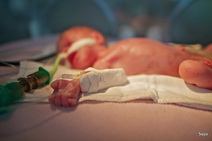 |
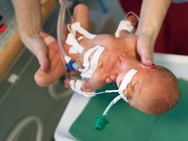 |
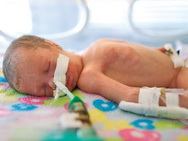 |
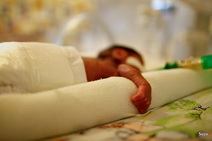 |
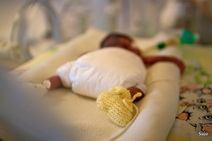 |
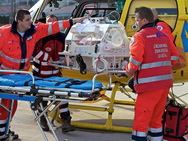 |
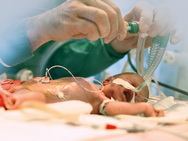 |
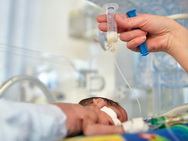 |
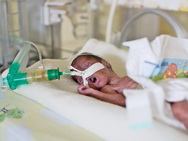 |
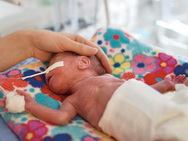 |
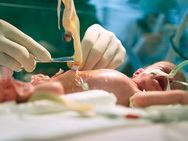 |
